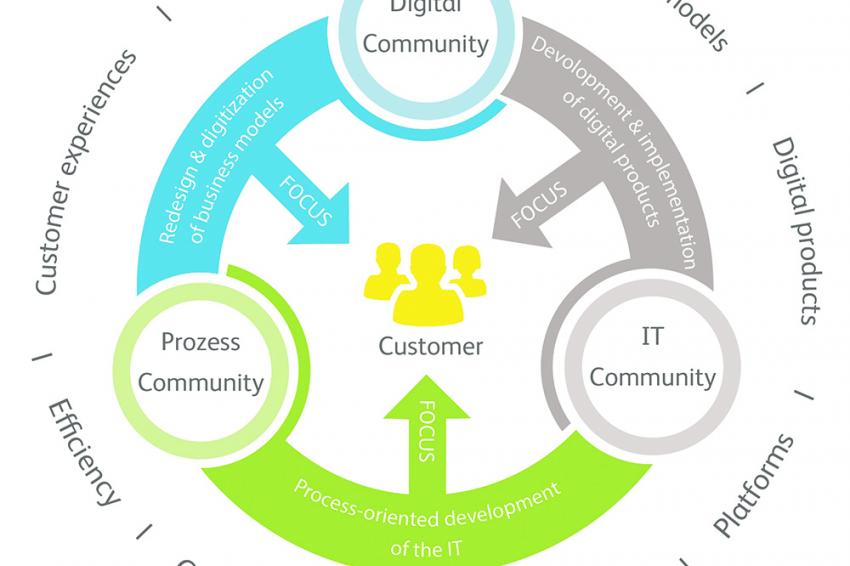A Powerful Tool to Meet the Digitalization Challenges
How Business Process Management Drives the Digital Transformation of Chemical and Pharmaceutical Companies
Business Process Management (BPM) makes short work of digital transformation, according to a joint study by BearingPoint & BPM&O. The BPM Study 2017 (published in Oct. 2017) presents a cross-industry picture of BPM implementation in German-speaking countries, and it confirms that chemical and pharmaceutical companies see "process digitalization" and "the development of new, disruptive products and services" as the biggest challenges in their digital transformation journeys.
Process-oriented Management and Digital Transformation Complement Each Other
Most chemical and pharmaceutical companies have long recognized the importance of process-oriented corporate governance. They have established process organizations with global process maps of governance, roles and methods. Digitalization is also high on their agenda, and hardly a month goes by without the launch of a new, large-scale digitalization initiative.
As customers become more demanding and unpredictable, and competition becomes more intense not only because of new players but also due to the increase in process digitalization, too many companies are optimizing existing processes only through the introduction of new technologies without also considering fundamental structural and process reforms. Corporate culture and the interests of functional organizations often stand in the way. These companies act traditionally, hierarchically and vertically instead of agile, horizontally and process-oriented. Although both BPM and digitalization are widely supported by the majority of participants, there continues to be a lack of understanding that only if the two are joined can their true power and potential be realized to sustainably contribute to the digital transformation of an enterprise.
Digital Redesign of the Process Landscape
The BPM study shows that pharmaceutical and chemical companies prefer to use BPM for a one-time harmonization of their system landscape, for addressing legal requirements and to pursue process cost optimization. Almost 70% of those surveyed see the optimization of historically grown processes and system landscapes as a key driver for the successful and sustainable establishment of BPM. The digitalization of processes and the development of digital products and services are regarded as the greatest challenges in the industry. Half of all chemical and pharmaceutical companies surveyed cite master data management and the development of an integrated data model as a significant "enabler" in the digitalization process. The development of new business models and IT security are also considered challenging.
50% of representatives from chemical and pharmaceutical companies are already using BPM to redesign the processes around better customer integration, and 40% are creating new access to services and products via digital channels. One quarter are working on the development of a customer journey map linked with the creation of a corporate process map along the customer touch points. And yet, only a fifth of those surveyed plans to open up their systems for partners and customers to share or create digital solutions.
If evaluated more closely, it turns out that most of the initiatives in terms of process digitalization are located in the areas of order processing, purchasing & production as well as financial & controlling processes. Significant potentials are also seen in the digitalization of research & development as well as risk & quality management processes. By contrast, digitalization in product and portfolio management is astonishingly low, and so too is the use of innovative technologies in marketing and planning processes.
Insufficient Process Performance Measurement
When asked whether and how the benefits of process optimizations and/or digitalization initiatives are measured, the results are ambiguous: overall, only 44% of participants have implemented a KPI-based measurement of BPM benefits.
Asked about the reasons for not carrying out sustainable process performance measurements, participants cited a lack of methods (63%), a lack of technical possibilities (50%) and a lack of competence (38%). While 38% claim to be already involved in setting up a process controlling method, a quarter say it is not enforceable in the organization, and 13% say it requires too much effort with another 13% saying it is simply not necessary.
An essential tool that not only helps increase the acceptance of BPM but also improves the success of digitalization projects is process mining. Providing the required transparency in process performance measurement, even in real-time if required, process mining has the potential to revolutionize how BPM can be operationalized on a broad front to sustainably strengthen process orientation in companies. By evaluating digital footprints in the supporting IT system, deviations can be assessed, optimal processes specified, and process changes can be made objectively measurable. Complex processes can be visualized and analyzed by mining, from the actual process data down to the transaction level if required.
Optimization and automation potentials are thus made visible and can be improved by other elements of BPM’s digital toolbox, such as robotics process automation (RPA) or cognitive computing. Especially for production and logistics processes, serialization software solutions are increasingly used for the consistent tracking of products. Key benefits of cloud-based track & trace solutions include the strengthening of product safety and compliance (anti-counterfeit protection), an increased visibility along the logistics chain (from the factory to the interim storage facility to the point of sale), better accessibility and direct communication with the end user. This makes BPM, in combination with digital solutions, a powerful tool to meet the challenges of digitalization.
Implementation of Digital Strategies
Successful BPM always requires close collaboration and the regular coordination of strategy, goals and initiatives between the digital community and the process and IT communities. Building consistent business process management allows for systematic consideration of strategic and operational needs, typically adding digital solutions that strengthen the process community, which in turn accelerates the digital transformation process and the value contributed to the business, a value that can be measured.









